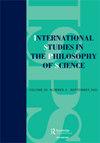费耶阿本德对量子测量理论的再评价
IF 0.8
2区 哲学
Q2 HISTORY & PHILOSOPHY OF SCIENCE
International Studies in the Philosophy of Science
Pub Date : 2022-01-02
DOI:10.1080/02698595.2022.2067811
引用次数: 2
摘要
摘要1957年,费耶拉本德在布里斯托尔的科尔斯顿研究研讨会上发表了一篇题为《量子测量理论》的论文,概述了冯·诺依曼的测量方案在没有崩溃的情况下的完整性,该方案仅使用了酉量子动力学和关于宏观量子系统的有充分动机的统计假设。费耶拉本德的论文被认为是对量子测量的早期贡献,预测了退相干的某些方面。我们的论文重新评估了费耶拉本德贡献的物理和哲学内容,详细介绍了技术步骤及其总体哲学动机和后果。总结我们的结果,Feyerabend将坍缩解释为量子力学中的实证主义假设,从而严格区分了量子力学中未解释的酉演化形式和描述测量后结果的经典解释的观测语言。因此,费耶拉本德采用了冯·诺依曼测量方案的无崩溃完成,以显示实证主义假设的可有可无性,从而为量子理论的现实解释开辟了道路。然而,我们注意到,他对计量的描述存在实质性问题,使其作为正统观点的合法陪衬的可行性受到质疑。我们进一步认为,他对冯·诺依曼测量方案的不满表明了早期对理论多元主义的看法。本文章由计算机程序翻译,如有差异,请以英文原文为准。
Feyerabend on the Quantum Theory of Measurement: A Reassessment
ABSTRACT In 1957, Feyerabend delivered a paper titled ‘On the Quantum-Theory of Measurement’ at the Colston Research Symposium in Bristol to sketch a completion of von Neumann's measurement scheme without collapse, using only unitary quantum dynamics and well-motivated statistical assumptions about macroscopic quantum systems. Feyerabend's paper has been recognised as an early contribution to quantum measurement, anticipating certain aspects of decoherence. Our paper reassesses the physical and philosophical content of Feyerabend's contribution, detailing the technical steps as well as its overall philosophical motivations and consequences. Summarising our results, Feyerabend interpreted collapse as a positivist assumption in quantum mechanics leading to a strict distinction between the uninterpreted formalism of unitary evolution in quantum mechanics and the classically interpreted observational language describing post-measurement outcomes. Thus Feyerabend took the no-collapse completion of the von Neumann measurement scheme to show the dispensability of the positivist assumption, leading the way to a realistic interpretation of quantum theory. We note, however, that there are substantial problems with his account of measurement that bring into question its viability as a legitimate foil to the orthodox view. We further argue that his dissatisfaction with the von Neumann measurement scheme is indicative of early views on theoretical pluralism.
求助全文
通过发布文献求助,成功后即可免费获取论文全文。
去求助
来源期刊

International Studies in the Philosophy of Science
HISTORY & PHILOSOPHY OF SCIENCE-
自引率
12.50%
发文量
10
期刊介绍:
International Studies in the Philosophy of Science is a scholarly journal dedicated to publishing original research in philosophy of science and in philosophically informed history and sociology of science. Its scope includes the foundations and methodology of the natural, social, and human sciences, philosophical implications of particular scientific theories, and broader philosophical reflection on science. The editors invite contributions not only from philosophers, historians, and sociologists of science, but also from researchers in the sciences. The journal publishes articles from a wide variety of countries and philosophical traditions.
 求助内容:
求助内容: 应助结果提醒方式:
应助结果提醒方式:


